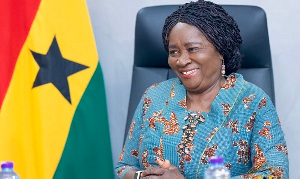THE GHANA Standards Board (GSB) and the Ghana Cylinder Manufacturing Company (GCMC) are engaged in an indirect tussle over which type of gas cylinder can be used in the country.
While the GSB has given the thumbs up to a new type of cylinder for liquefied petroleum gas (LPG) on the Ghanaian market, the GCMC is adamant that the new product is dangerous. The product at the centre of the tussle is the Complet range of composite LPG cylinders that are manufactured in Norway. It is 3-layer design made up of a high density polyethylene moulded liner, a composite load carrying material made of resin and fiberglass and an injection moulded outer casing.
Nana Wiafe-Ababio, CEO of GCMC says though they are not an enforcement agency, they are concerned about "the life of Ghanaians and anything that has (something) to do with gas." The company tries not to allow substandard cylinders and accessories into the country.
Aid in an unusual move, the GCMC organized what an official of the Standard Board has described as "a crude thing to dot, by setting one of the Complet cylinders on fire in what was termed the destroyer test.
"You just cannot test cylinders that way. You do not use a bonfire to test a gas cylinder. There is a standard way for testing... Indeed twenty European countries use the international standard. We did not give them the mandate to do what they did," the GSB official said.
The GCMC CEO says the enforcing bodies are not doing their work as fake regulators, substandard cylinders and accessories get into the country. He said that the GCMC contacted the Standard Board when news of the new product surfaced and were told that the enforcing agency did not know anything about it.
But when they alerted the media, the GSB according to the GCMC boss came out saying that it had tested and approved the cylinders. Nana Wiafe is insistent that the climatic conditions of Norway where the composite cylinders are manufactured, is not the same as the climate in Ghana, making the product unsuitable for the Ghanaian market.
While advocating a Legislative Instrument (LI) on substandard cylinders from the West, Nana Wiafe accused the GSB of sabotage saying "I do the little that I can to educate the public, but the enforcing body which should take up the issue is rather sabotaging it."
There are generally two types of cylinders that can be used to store gas - the metal kind which is most common in Ghana and the liner and metal kind which the Complet type is similar to.
The officials of GSB confirmed that the new cylinder was safer than the metal gas cylinder which can explode. The new product met the standards of the GSB after it was taken through the "proof and burst" test in which the cylinder in subjected to high pressure until it splits. The same test leads to metal cylinders exploding.
According to Mr. Kwabena Acheampong Director of Testing Division of the Ghana Standard Board, developed countries have made the use of metal cylinders illegal with an increasing shift to the use of fibre glass glass cylinders. "Business men who know that the metal cylinder is illegal in the developed countries import and in some cases refurbish to sell," he said.
He also said that the pressure needed to burst the fibre glass cylinder is twice that of the metal cylinders. He added that "Technology is changing. Fuel tanks of vehicles are now made of other materials apart from metal. There are even underground fibre glass fuel tanks for filling stations. Fibre glass is impervious to water and does not rust.
Another official of the GSB described the fibre glass cylinder as of superior quality.
Information available to Sunday World indicate that the RAGASCO company of Norway is a leading producer of composite LPG containers. Its products are sold in some thirty countries including Canada, South Africa, Switzerland and Malaysia, countries with more advanced testing methods. The company has partnered gas entities like British Petroleum (BP) and Statoil, a Norwegian oil company, for the distribution of the composite gas containers (cylinders).
The third leg of the tussle involves Top Gas Company Limited, the distributors of the Complet range of fibre glass cylinders in Ghana. Jeff Mensah Hughes CEO of Top Gas, described comments by GCMC that the product is substandard as"sabotage." He told Sunday World that his business had been affected by the story put out by GCMC.
"Demand was quite high until the story that said our product was made of rubber and therefore not good. They also burnt the cylinder without informing us. About three hundred customers returned their cylinders when they heard of the negative stories. We are preparing to go to court against the GCMC and the media houses that carried the story," he revealed.
The tussle between the GSB and the GCMC spills over into the area of refurbished cylinders. While Nana Wiafe says "we also do refurbishment of cylinders as Ghanaians are economical," the GSB is advising against the use of refurbished cylinders, "do Director not patronize refurbished cylinders" as Mr. Acheampong of the Testing Division put it.
General News of Wednesday, 18 June 2008
Source: Sunday World












